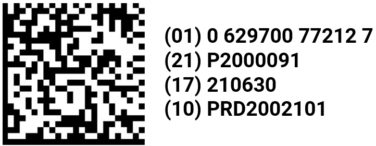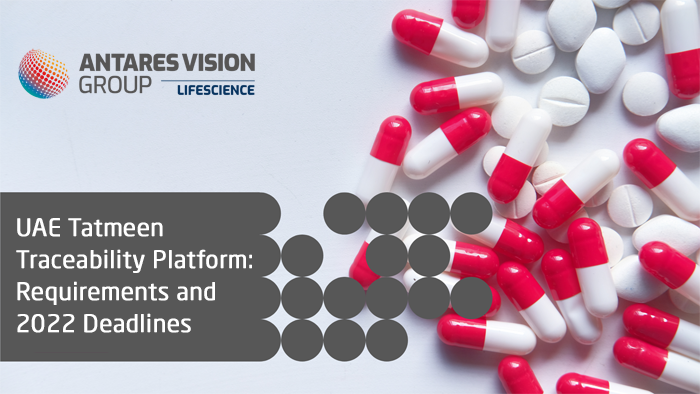The global push for pharmaceutical traceability and serialization continues at a furious pace. Today, we’re looking at the United Arab Emirates (UAE), whose Ministry of Health and Prevention (MOHAP) in June 2021 announced the “Tatmeen” platform for UAE pharmaceutical products traceability. There are key deadlines this year, so let’s take a look.
UAE Pharmaceutical Products Traceability and the Tatmeen System
MOHAP established Tatmeen, which means “assurance” in Arabic, in Ministerial Decree No. 73 on June 14, 2021. Described as a “central command center,” it’s a GS1-based platform for UAE pharmaceutical products traceability. MOHAP’s partners include the Dubai Health Authority (DHA), Department of Health (Abu Dhabi), and EVOTEQ, a “digital transformation catalyst” based in the UAE, and GS1 UAE.
Tatmeen’s goals should sound familiar:
-
- Fight counterfeits and illegal and substandard medications
- Eliminate unauthorized imports
- Improve recall management
- Ensure expired and about-to-expire drugs don’t reach consumers
- Forecast demand and avoid shortages
- Move drugs where they’re needed quickly and safely
- Protect pharma companies, including their intellectual property rights
These other aspects should also sound familiar:
-
- Products are scanned at every node of the supply chain
- Product information is reported into to a central repository (in this case GS1’s BrandSync platform)
- Scanning captures and verifies data in real time and reports information into a central database
- Hospitals and pharmacies scan when drugs arrive at their facility and when they’re dispensed
- Patients and consumers can scan with mobile devices to validate products, report expired products, fakes, and suspected gray market activity
Tatmeen will integrate with the DHA’s electronic medical record system, Salama (incorrectly identified as “Salam” in some industry sources). It will also utilize DHA’s Tarmeez, a paperless drug and medical supplies management system that gives authorized users access to a centralized electronic catalog of all available inventory.
Tatmeen labeling and reporting requirements
All conventional medicines sold, distributed, or stored in the UAE are regulated and must be serialized. These products are exempt:
-
- Free samples
- Products imported for personal use only
- Medical devices and supplies
- General sales list (GSL) products
And —surprise, surprise — UAE pharmaceutical products traceability requirements should sound familiar. Secondary packaging must contain four data points in a GS1 DataMatrix code and in human-readable form:
-
- Global Trade Item Number (GTIN)
- Randomized serial number (up to 20 characters)
- Expiry date (in YYMMDD format)
- Batch or lot number
This example is adapted from the MOHAP’s serialization guide:

Aggregation requirements should also ring a bell: All logistic units must be aggregated and labeled with a GS1-128 barcode encoded with a serial shipping container code (SSCC). Manufacturers are responsible for aggregation.
If a brand owner regards an item as a trade item, “it may additionally be identified with a GTIN.” Distributors, wholesalers, and health facilities that unpack and re-pack products to deliver to points of dispensing are required to aggregate the logistic units using their own SSCC codes.
Marketing authorization holders (MAHs), brand owners, manufacturers, or their subsidiaries must register and upload the mandated product master data into the BrandSync platform.
Domestic and foreign manufacturers, third-party logistics providers, batch releasers, contract manufacturing organizations, distributors, licensing agents, and MAHs are responsible for collecting serialized product item traceability records and reporting them to Tatmeen.
UAE pharmaceutical products traceability rollout and 2022 deadline
There was a 6-month “status adjustment” period after Tatmeen was announced for manufacturers and marketing authorization holders to register with the BrandSync platform and begin using 2D DataMatrix codes. This deadline passed on December 13, 2021.
The next major deadline is December 13, 2022. By that date, all supply chain actors in the UAE must obtain a Global Location Number (GLN) from GS1 UAE to identify their organization, where it’s located, and other required information. Relevant stakeholders must also begin reporting serial numbers to Tatmeen and begin aggregation with GS1-128 barcodes and SSCCs.
Final thoughts
We noted a few times that parts of the Tatmeen regulations should sound familiar. If you follow our blog and read our articles about pharmaceutical regulations in other countries — DSCSA in the United States, Chestny ZNAK in Russia, ANVISA in Brazil, ASL BELGISI in Uzbekistan, and so on — everything about UAE pharmaceutical products traceability should ring a bell.
As we said right at the start today, the global push for pharmaceutical traceability and serialization continues at a furious pace. Requirements may vary from country to country, but their essence is the same (e.g., protecting consumers, serialization, traceability, electronic reporting, central repositories, GS1 standards). Tatmeen is just one more example in a very large regulatory ocean.
It’s easy to feel swept up in this current. And, truth be told, if you’re not complying now or preparing to comply by published deadlines, you’re putting your business in jeopardy. If you have questions about Tatmeen or complying with pharmaceutical serialization and traceability regulations in any country, contact us today. In just a few minutes, our supply chain specialists can demonstrate how our award-winning Traceability System ensures you’re compliant in any country, today, tomorrow — always.
For even more information, check out our Global Compliance Page, download our Worldwide Pharmaceutical Compliance Requirements white paper, and catch up on other pharma news in our blog:
-
-
- FDA National Drug Code: Proposed Format Changes and Industry Impact
- Egypt Pharmaceutical Supply Chain: News and Regulations
- Uzbekistan ASL BELGISI Update: Deadline for Pharma Serialization Extended
- Understanding Africa’s Supply Chain (3-Part Series)
- rfxcel DSCSA Compliance Library: A One-Stop Shop of DSCSA Information
-





